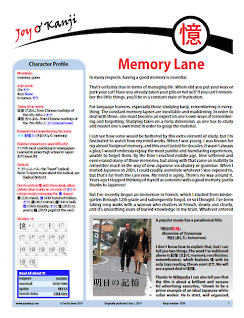憶
memory; guess
Kanji 1039
Thank you for visiting this Character Home Page. Below you'll find a synopsis of the essay. If you wish to read the full text, the PDF of the essay is available for purchase to the right.
Our unreliable memories play fascinating tricks on us. See how the Japanese talk about such matters, from having mistaken memories to keeping things in mind. Learn a surprising way to improve your memory. And see how to say all of this: "A flood of memories is coursing through my head," "The older we get, the weaker our memory becomes," and "I wish I had a better memory."
Revision history:
Sept. 13, 2024: p. 6: Said that 消す appears in the book title in its negative potential form (not negative passive voice).
Aug. 5, 2022:
- p. 12: Changed the definition of 憶念 to “something held firmly in the mind; one's own thoughts,” removed the subsequent paragraph about examples of this term (because they weren’t actually applicable), and mentioned that the keyword is extremely uncommon.
- p. 12: Changed the breakdown of 臆断 from “guess + conclusion” to “guess + decision.”
- p. 13: Slightly modified the first paragraph, which is about 憶 versus 臆.
June 25, 2021: p. 14: Added a link to the Kanshudo games.
July 5, 2019: Originally published.



Comments